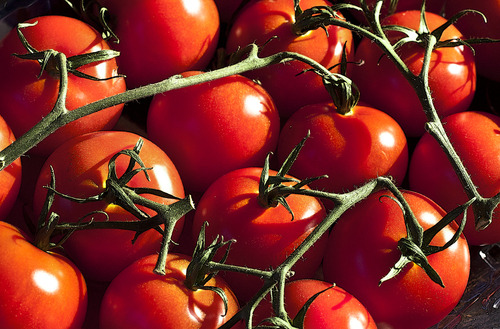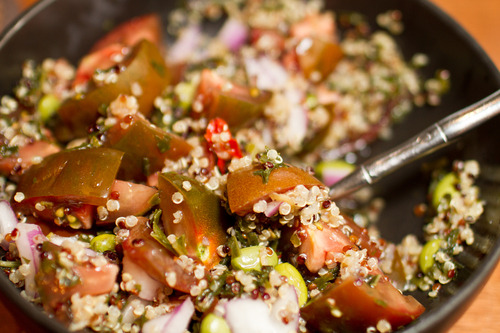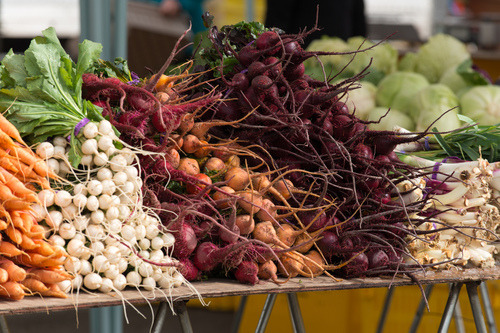We just can’t get enough of Earth Week, and for this Wednesday’s Pause for Prevention we want to highlight 6 easy food swaps that are good for you AND good for the earth!
At least a few of these apply to everyone, so count yourself in and get swappin’.
#healthyearth #healthyyou!
1. Swap Conventional Tomatoes For Organic
There’s research to support bothsides of the organic food argument. Some report it’s better for both our bodies and the environment, while others argue there really isn’t much of a difference either way.
Still, forgoing chemicals can’t hurt, especially when it comes to certain foods known for their high levels of pesticides. “You don’t necessarily need organic,” says Vandana Sheth, R.D.N., C.D.E., a spokesperson for the Academy of Nutrition and Dietetics. “But for certain food groups it might make sense.”
In fact, recent research suggested there might be a distinct health advantage to some organic produce. A 2013 study found that organic tomatoes contain higher levels of antioxidants and vitamin C than their conventionally-grown peers. “When grown properly, organic fruits and vegetables can have a higher nutrient density,” Consumer Reports senior scientist Michael Hansen, Ph.D. told Everyday Health at the time.
2. Swap Rice For Quinoa

Rice may be a diet staple for billions of people, but the amount of fresh water that goes into farming the grain is of concern. As much as one-third of the world’s fresh water supply goes into rice production, according to Oxfam.
While alternative practices are in development, it’s a good idea for the planet to cut back, and luckily there are nutritious alternatives. Simply switching to brown rice cuts back on processing, but a high-protein grain like quinoa offers even more health-promoting benefits. Mix up your quinoa routine with some barley or corn so you’re not overdoing it on one type of grain, suggests Sheth.
3. White Bread For Whole Wheat

Similar to the switch from white rice to brown, swapping white bread for whole wheat can give your health and the environment a boost. Whole grains in general are better sources of nutrients and filling fiber and also spend less time in production, explains Mother Nature Network. “Any ingredient that requires extensive refining requires more energy and resources and has a greater impact on the planet,” the site reports.
4. Meat For Vegetarian Meals

There’s no need to say goodbye to meat for good if you’re a fan. But initiatives like Meatless Monday exist to demonstrate the benefits of even cutting out just one meat meal a week.
Forgoing one burger a week has the environmental impact of taking your car off the road for 320 miles, according to the Environmental Working Group. And if your family of four skips meat and cheese for an entire day each week, it’s like taking your car off the road for five weeks.
“Getting more vegetables and fruits throughout the day, and meat in smaller portions, gives you more vitamins and nutrients and fills you up with fiber,” says Sheth. Eating a plant-based diet also seems to protect against heart disease, according to the Mayo Clinic.
To ensure you’re still getting enough protein, try beans or lentils, both of which rank highly on EWG’s list of eco-friendly eats, or tofu, says Heather Bauer, R.D., founder of Bestowed.
5. Grain-Fed To Grass-Fed Beef

Beef has one of the highest carbon footprints of all foods, according to the EWG. If you just can’t give it up, at least look for grass-fed beef when you can. Grass-fed beef can be more expensive. But growing grass requires less energy than growing grain to feed animals — not to mention the water and pesticides involved, says Sheth.
Grass-fed beef also boasts more omega-3 fatty acids, more vitamins A and E and higher levels of antioxidants, all for fewer calories, Cooking Light reported.
6. Supermarket Finds For Farmer’s Market Gems

It’s all about looking locally, Sheth says: “When produce is picked fresh, you’re maximizing the nutrient value.” Locally-grown produce isn’t forced to lose its nutrient value during a long process of getting to your plate — and it doesn’t require the same energy to get it there, either.
Don’t forget to bring your reusable shopping bags to the farmer’s market, she adds.
Photos and article courtesy of: www.huffingtonpost.com







